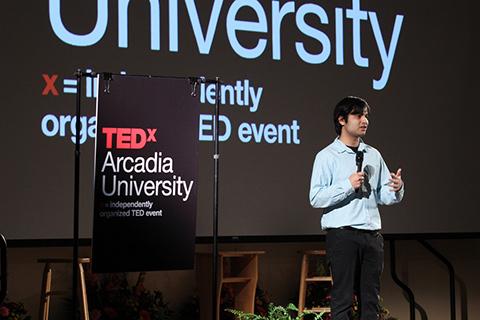TEDxArcadiaUniversity Sets Table for Broad Ideas on Hunger

By CHRISTOPHER SARACHILLI ’14 and JASMINE L. HENDERSON ’15
It may run counter to common sense to think that many residents of one of the most obese cities in America would suffer from hunger. With 25 percent of its population living below the poverty line, though, Philadelphia is not only one of the obese cities it is also one of the poorest large cities in America, a trend common to several formerly industrial cities in the North.
Phil Forsyth, executive director of the Philadelphia Orchard Project, provided a desolate, complex view of city of both poverty and obesity during his presentation at TEDxArcadiaUniversity on March 30. (Watch videos of all the presentations.) The organization plants orchards throughout the city in an effort to create green space out of the 40,000 vacant lots that litter Philadelphia, providing locally grown fruit and educating the city about planting, tending, composting, and food processing.
Sponsored in part by Arcadia University, Whole Foods, Trader Joe’s, ShopRite, and the Glenside Rotary Club, TEDxArcadiaUniversity is an event aimed at replicating TED’s mission of “ideas worth spreading.” TED (Technology, Entertainment, Design) is a nonprofit dedicated to sharing ideas through short, pointed talks at larger TED conferences, online TED talks, and the type of smaller, independent TEDx events held at Arcadia and in other communities. In spite of hard rain and flooding, Arcadia’s conference brought students, faculty, and community members to the Commons Great Room for the day’s three sessions: 50 people in the morning, 75 people in the early afternoon, and 93 people in the late afternoon.
This year’s event, themed “Feeding America,” was the second organized by adjunct professor of theater arts Celeste Walker with the help of Honors students Samantha Baggott ’15, Rachel DeLasmo ’14, Anna Dienstman ’14, Emily Eliasen ’16, Alexa Gonzalez ’15, Amber McDaniel ’16, Sammy Nickalls ’14, Ruth Stetler ’15, and Gabrielle Thomas ’14 and offered 12 presentations that addressed not only hunger of the body but also of the soul and mind.
Nancy Dennehy ’16 was one of many who responded to the conference’s widespread approach to hunger and felt that including more abstract forms of hunger made the presentations more interesting and relatable. Similarly, as Ashley Walter ’16 discussed her favorite presentations, she flipped through a notebook filled with pages of ideas, quotes, and inspirations she had written during the presentations.
“[The Philadelphia Orchard Project] really resonated with me,” said Walter, who is considering trying to work with the organization in the future.
Others, like Brianna Kiesel ’16, were especially impressed by Dr. Patricia Robertson’s talk, “Food for Thought,” a presentation about the sudden moments that define, redirect, or completely upend our lives and the ways in which we move forward from those events.
“She brought the different moments that change our lives to the table,” said Kiesel. “I loved the experiences she shared with us, and they made me think about what has happened in my own life to get me where I am right now.”
The personal anecdotes that all of the speakers revealed helped connect with the audience in moving ways. Community member Abel Rodriguez connected with blogger Zenique Gardner’s presentation on “Why We Should Be the Soul Food Generation.” Gardner told the audience about her family working through their differences and worries around a table with macaroni and cheese, candied yams, collard greens and fried chicken that only her grandmother could burn the right way. Listening to how Gardner’s family culture impacted the way she approaches her relationships with others “inspired us to go deeper with the people in our lives,” said Rodriguez, who loves the creative solutions that TEDx conferences bring.
“This isn’t the stuff you hear about on a daily basis,” said Rodriguez. “You come to one of these talks and you get a concentrated dose of inspirational, interesting work.”
Photos by Madeline Seton ’14 and Kara Wright ’14


